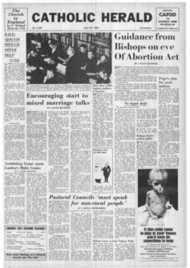Page 6, 26th April 1968
Page 6

Report an error
Noticed an error on this page?If you've noticed an error in this article please click here to report it.
Tags
Share
Related articles
Sarcasm And Satire Of Critic
For It
Father Crehan On Theology
De Rosa's Motion Picture Of The Deeply Human Jesus
How To Teach Teacher
ROSA'S SALVATION HISTORY
Fr. J. H. CREHAN,
God our Saviour by Fr. P. de Rosa (Geoffrey Chapman 30s.1
SALVAT1ON history, as Fr. de Rosa understands it, does not mean just "going on about Abraham," who receives only one page in the book: the abundance of quotations, at the rate of one a page, shows that the author has read more than his manuals of theology. He prefers the viewpoint of the Eastern Fathers such as Athanasius, seeing the Redemption as God's work for the rescue of man, rather than the introspective approach of Augustine, in which the sinner finds in Christ a substitute for himself.
It would have been simpler to go to Athanasius for this and not to present it as a irintvaille of Bultmann. There are chapters on the mission of the Holy Ghost, the sacrifice of Christ and the Second Coming. In this last one misses the link with the Old Testament idea of the Day of the Lord, an idea widened by Christ so as to become "one of the days of the Son of Man."
There is a certain amount of encouragement to readers to mend their ways in the light of new emphases in theology, but this does not always come off. Thus Catholic piety is blamed for a habit of confusing the two natures in Christ and of speaking of actions of His earthly life as: "God does this or that." Now after examining more 0-level candidates from .Catholic schools on their knowledge of the gospels than there have been days in the life of Fr. de Rosa. I can safely say that I have never met this error. save in candidates from Malta.
Again the new theory offered about the human knowledge of Christ is unsatisfactory, allowing Him less contact with the divine than came to an inspired prophet who was conscious of his inspiration.
On the theology of the Mass there is use made of Pius XII, but the matter of concelebration leads the author into a sad confusion. He puts forward the Rahner, theory, twice rejected by Pius XII and again by the Council and by Paul VI, a theory which requires that only one priest say the Mass while the rest communicate at his hands; this theory is then offered as a justification for the present practice of the Church where all the priests join in consecrating.
One debt the author has not paid. He twice quotes passages from Dean Robert Wilberforce without further identification than that he is. or was, a Protestant theologian. He was in fact the only Tractarian who deserved the name of a systematic theologian. Manning advised him, even before he became a Catholic, "not to commit himself in print to a syllable contrary even to the terminology of the Catholic Church" and to read St. Thomas, Suarez and Vasquez.
blog comments powered by Disqus











